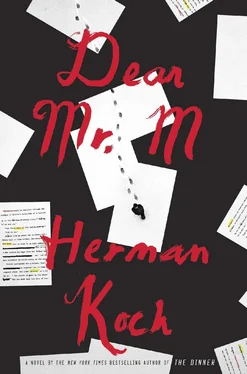Three hundred thousand readers; that’s three hundred thousand different faces for each character. Three hundred thousand faces that are destroyed at one fell swoop by that one face in the movie. As a reader, it’s pretty tough to remember that imaginary face after seeing the actor on the screen.
Two high school students mastermind their teacher’s perfect murder. That’s the first line of the text on the back cover.
Two factual inaccuracies, in the very first sentence. Because we never masterminded anything — and it was anything but perfect.
There’s no need for me to cite the rest of the text here, you know well enough how it goes. That first sentence wasn’t there on the first eighteen editions, it was added only for the film version. But it’s been on every edition ever since. The book has been molded to fit the movie. A movie that differs from the book on a few essential points. Just as your book differs from reality on a few essential points. From the real events on which it’s based.
Those latter differences are understandable enough. You ran into a few blank spots that your imagination had to fill in. And I must say: Hats off! You got awfully close.
But not close enough.
How would you like to have the chance to fill in those blanks all over again? A revised edition of Payback in which the unsettled questions are settled at last? If I were a writer, I wouldn’t be able to resist the temptation.
It was a little less than a year ago that you moved in upstairs. That would never be possible in a novel. Writer moves into apartment above…well, above what? A character? No, I’m not one of your characters. I’m a flesh-and-blood human being on whom a writer has loosely based a character. In a novel, it would be completely implausible. Too much of a coincidence. Coincidence undermines a story’s credibility.
There’s only one area in which we accept coincidence, and that is in reality. “Such a coincidence!” we say, and then we dish up a juicy anecdote in which coincidence plays a major role.
Conversely, you could say that the coincidence that has made us neighbors is only plausible because it takes place in the real world.
You could never come up with that yourself, people say. At least, a writer never would.
I remember so clearly the afternoon when I went to see the movie version of Payback . There weren’t very many people in the theater, it was a matinee. I remember the moment when the high-school students appeared on screen for the first time. The boy takes the girl by the arm.
“I want you to know that I care about you more than anyone else in the world,” he says, and I couldn’t help laughing at such a totally unnatural and implausible line, spoken by an even more implausible actor — the kind of actor you see only in Dutch feature films. I laughed so loudly that I was hissed at from all corners of the darkened theater.
People read a book and imagine the faces themselves. Then they go to the movie version and the imaginary face is destroyed by the face of the actor on the silver screen.
With me, that was totally different. In both the book and the movie, I kept seeing the same face.
My own.
The postcard came this morning. A postcard…there’s something touching about that, something from days gone by. The same days gone by to which you belong, where your roots lie, you might say.
You yourself are all too pleased to make a show of those days gone by. In interviews you never fail to emphasize your lack of confidence in modern inventions. Computers, the Internet, e-mail, cell phones — all things you keep at bay.
“My wife does all my e-mails, I’m too old to start in on that.”
“Sometimes I hear the cell-phone conversations people carry on in the train and I ask myself whether we’ve made any real progress since the days of the Neanderthal.”
“I write the first version in longhand, then I type it over. On an old-fashioned typewriter, yes. I tried it once, writing on a computer, but had the feeling right away that I was checking in passengers at an airport. Or working at the local branch office of a bank.”
Every once in a while you go too far with it, and the coyness shines through. Like when you cast doubt on the sense of electronically amplified guitars.
“Why for God’s sake does a guitar need to be amplified? When I hear it, I always have the sneaking suspicion that the guitarist isn’t really technically competent, that he’s trying to mask that by making as much noise as possible.”
Who are you trying to impress with comments like that? Probably those readers who, like you, grew up during World War II. Those readers who (like you) believe that after a certain age there are no new experiences to be had.
Otherwise, of course, you have every right to do what you do. Writing on a typewriter, why not? It’s not about whether people are right or wrong to live in the past, it’s about whether or who they’re trying to impress.
If you ask me, that’s what you’re out to give your readers: a potbelly stove rather than central heating, a bike with coaster brakes, a teacher you address as “Mr.” and “sir,” rather than a teacher who tries to be just as young as his pupils. Just as young and sexy, I should really say — the latter above all.
As a matter of fact, you’re sort of right to be so naive. Those cell-phone conversations really are completely vacuous, of course, but then so are all conversations. Including those held around the old-time cracker barrel. There’s no reason to wax nostalgic about how those cracker-barrel conversations were more edifying than the ones carried on today in a train that is — per usual — running late (“Hi, it’s me, no, we’re standing still again, where are you?”).
People prefer to talk about nothing at all, it’s been that way for thousands of years and everyone’s fine with that. To say nothing, quite intentionally, of e-mails and text messages. E-mails and text messages facilitate social contact the way a laxative facilitates defecation. But when one takes an overdose of laxative, as we all know, the result is only diarrhea.
You, in fact, are doing the right thing when you write longhand and then type your sentences letter by letter on a blank sheet of paper: that forces one to think slowly. For the sake of convenience, I won’t go into whether a mediocre mind is served at all by thinking slowly. It’s the idea that counts.
The reason your wife sent a postcard is because an e-mail or text message would be a no-no. Her handwriting is cute, it’s — I say this without duplicity — girlish. Handwriting with lots of round shapes in the letters, and with round, open dots over the i ’s. Psychologists say that open dots over the i ’s are an indication of egocentrism, but when it comes to that, if you ask me, you have to draw a sharp distinction between men and women.
Sometimes I run into the postman while he’s filling the boxes down by the front door. At other times, like this morning, he’s still busy sorting the mail out by his cart.
“Give it here, I’ll do it,” I say.
“Are you sure?”
“Sure. People have to help each other, right?”
That’s the way it goes, all the time. Completely natural. A nice, normal man lends the postman a helping hand. Only in the course of a subsequent reconstruction, in black and white and with an ominous voice-over, might one see something abnormal in it. Only with the advantage of hindsight concerning what happened next, and with the aid of tendentious music, does being handed mail that is not addressed to you take on something sinister.
I always wait until the postman has walked on with his cart before starting to fill the boxes. I look at each package or envelope before slipping it into the appropriate mail slot. For me, it has never been anything but plain old curiosity. Or healthy interest, if you will. On the basis of bank statements, subscriptions, and warning notices, I get to know my neighbors better. I never go too far. I study the blue envelope from the tax service for no longer than a second, then put it in the mailbox of the one to whom it is addressed.
Читать дальше












